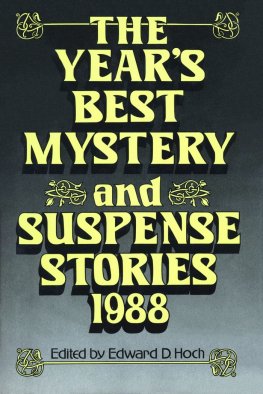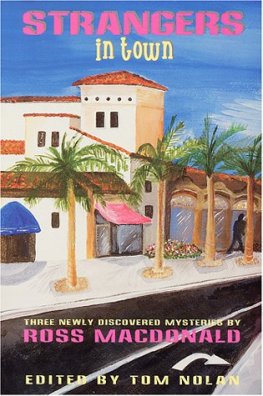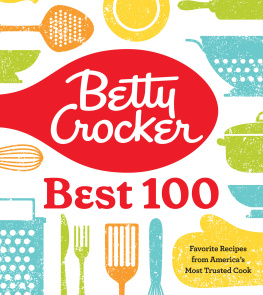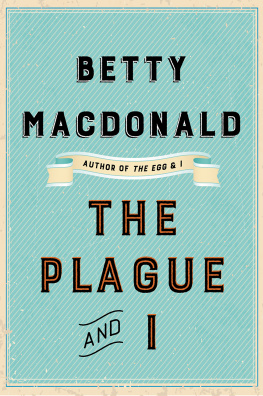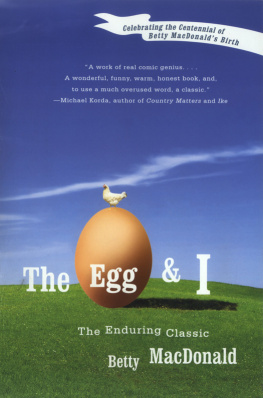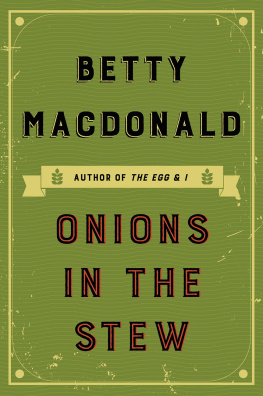THE EGG AND I
BY BETTY MACDONALD
J. B. LIPPINCOTT COMPANY
PHILADELPHIA NEW YORK
Copyright, 1945, by
BETTY MacDONALD
FIRST IMPRESSION, JULY, 1945
SECOND IMPRESSION, SEPTEMBER, 1945
THIRD IMPRESSION, SEPTEMBER, 1945
FOURTH IMPRESSION, OCTOBER, 1945
FIFTH IMPRESSION, OCTOBER, 1945
SIXTH IMPRESSION, OCTOBER, 1945
SEVENTH IMPRESSION, NOVEMBER, 1945
EIGHTH IMPRESSION, DECEMBER, 1945
NINTH IMPRESSION, DECEMBER, 1945
TENTH IMPRESSION, DECEMBER, 1945
ELEVENTH IMPRESSION, JANUARY, 1946
TWELFTH IMPRESSION FROM NEW PLATES, FEBRUARY, 1946
THIRTEENTH IMPRESSION, FEBRUARY, 1946
FOURTEENTH IMPRESSION, FEBRUARY, 1946
FIFTEENTH IMPRESSION, MARCH, 1946
Printed in the United States of America
TO MY SISTER MARY
who has always believed that I can
do anything she puts her mind to
CONTENTS
- Such Duty
- And I'll be Happy
- Battre L'Eau avec un Bton
- "Who, Me?" or "Look 'Peasant,' Please!"
- November
- The Vanquished
- Infiltration
- Mental Block
- Spring
- The Whistle Blows
- People
- I Learn to Hate Even Baby Chickens
- The Lure of the Tropics
- The Mountain to Mohammed
- Summer
- Who Bothers Whom?
- That Infernal Machine, the Pressure Cooker
- This Beautiful Country
- Fancywork Versus the Printed Word
- With Bow and Arrow
- All Our Kids Have Fits
- Timnah!
- Autumn
- And Not a Drop to Drink
- The Root Cellar
- Game or Who Is?
- The Theatahthe Dahnse!
- Put Out That Match
- You Win
PART ONE
SUCH DUTY
Such duty as the subject owes the prince,
Even such a woman oweth to her husband.
Shakespeare
1
And I'll Be Happy
A long with teaching us that lamb must be cooked with garlic and that a lady never scratches her head or spits, my mother taught my sisters and me that it is a wife's bounden duty to see that her husband is happy in his work. "First make sure that your husband is doing the kind of work he enjoys and is best fitted for and then cheerfully accept whatever it entails. If you marry a doctor, don't whine because he doesn't keep the hours of a shoe clerk, and by the same token if you marry a shoe clerk, don't complain because he doesn't make as much money as a doctor. Be satisfied that he works regular hours," Mother told us.
According to Mother, if your husband wants to give up the banking business and polish agates for a living, let him. Help him with his agate polishing. Learn to know and to love agates (and incidentally to eat them).
"It is depressing enough for a man to know that he has to work the rest of his life without the added burden of knowing that it will be work he hates. Too many potentially great men are eating their hearts out in dull jobs because of selfish wives." And Mother had examples too. There was the Fuller Brush man who came to our house once a month and told Mother how deliriously happy he used to be raising Siberian wolves and playing the violin with a symphony orchestra until he ran afoul of and married Myrtle. The man in the A & P vegetable department who was lilting through life as a veterinary surgeon until he married a woman who hated animals but loved vegetables. And the numerous mining men Mother and Daddy knew who were held down to uninspiring company jobs by wives who wouldn't face the financial insecurity of their husbands going into business for themselves.
"Boy," we said, "when we get married, our husbands will do exactly as they please," and they have.
This I'll-go-where-you-go-do-what-you-do-be-what-you-are-and-I'll-be-happy philosophy worked out splendidly for Mother for she followed my mining engineer father all over the United States and led a fascinating life; but not so well for me, because although I did what she told me and let Bob choose the work in which he felt he would be happiest and then plunged wholeheartedly in with him, I wound up on the Pacific Coast in the most untamed corner of the United States, with a ten-gallon keg of good whiskey, some very dirty Indians, and hundreds and hundreds of most uninteresting chickens.
Something was wrong. Either Mother skipped a chapter or there was some great lack in me, because Bob was happy in his work but I was not. I couldn't learn to love or to know chickens or Indians and, instead of enjoying living in that vast wilderness, I kept thinking: Who am I against two and a half million acres of mountains and trees? Perhaps Mother with her flair for pioneering would have enjoyed it. Perhaps.
Where Mother got this pioneer spirit, how she came by it, I do not know, for a thorough search of the family records reveals no Daniel Boones, no wagon trains heading West with brave women slapping at Indians with their sunbonnets. In fact, our family tree appears rife with lethargy, which no doubt accounts for our all living to be eighty-seven or ninety-three.
Mother's ancestors were Dutch. Ten Eyck was their name and they settled in New York in 1613. One of my father's family names was Campbell. The Campbells came to Virginia from Scotland. They were all nice well-bred people but not daring or adventuresome except for "Gammy," my father's mother, who wore her corsets upside down and her shoes on the wrong feet and married a gambler with yellow eyes. The gambler, James Bard of Bardstown, Kentucky, took his wife out West, played Faro with his money, his wife's money and even some of his company's money and then tactfully disappeared and was always spoken of as dead.
We never saw this grandfather but he influenced our lives whether he knew it or not, because Gammy was a strong believer in heredity, particularly the inheritance of bad traits, and she watched us like hawks when we were children to see if the "taint" was coming out in any of us. She hammered on my father to such an extent about his gambling blood that he would not allow us children to play cards in any form, not even Slap Jack or Old Maid, and though Mother finally forced him to learn to play double Canfield, he died without ever having played a hand of bridge, a feat which I envy heartily.
The monotony of Mother's family was not relieved in any way until she married Darsie Bard who was her brother's tutor and a Westerner working his way through Harvard. This was a very shocking incident as Mother's family believed that the confines of civilization ended with the boundaries of New York State and that Westerners were a lot of very vulgar people who pronounced their r's and thought they were as good as anybody. Mother's mother, whom later we were forced to call Deargrandmother, had fainting fits, spells and tantrums but to no avail. Mother went flipping off without a backward glance, to live, for Heaven's sake, in Butte, Montana.
This was Butte in the early 1900's. The time of the Copper Kings, when everyone made a million dollars, there were thirty-five thousand miners working underground and a saloon every other doorway. Irish scrubwomen became the wives of millionaires and had interior decorators come from France to 'do' their houses. Lawns were imported blade by blade and given the care of orchids in order to make them grow in that sulphur-laden air. Oriental rugs were a sign of wealth and grandeur and were put on the floors three deep and piled in heaps in attics. Southern mansions, French chateaus, Welsh stone cottages, timbered English houses, Swiss chalets and American bungalows were built to house the rich Irish. Everyone was cordial, bluff and gay and entertained lavishly and all the time. A party was given at the Silver Bow Club to welcome Mother to Butte and she was amazed to find that the ladies of the town wore Paris gowns but painted their faces like prostitutes. Mother had been reared to believe that if you were unfortunate enough to be born with a pale green face, you, if you were a lady, would not for a moment entertain the thought of rouge, but would accept your color as your cross and do nice things for poor people. Mother had been reared this way but she didn't endorse such nonsense. Fortunately she had natural color so she wasn't put to any test, but she was certainly pleased to find that the ladies of Butte, and there were many ladies in the strictest sense of the word, had kicked over the traces from Boston to Atlanta and were improving on nature with everything they could lay hand to. Mother loved the West and she loved Westerners.


